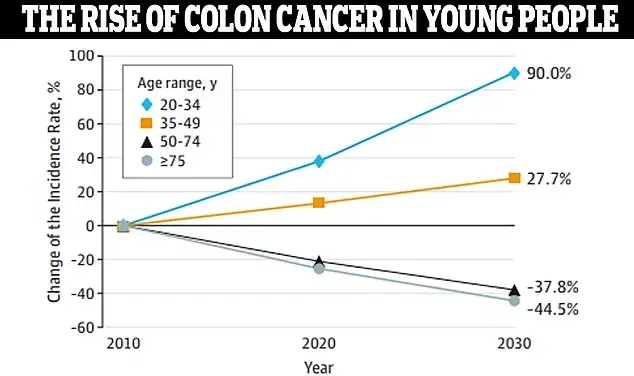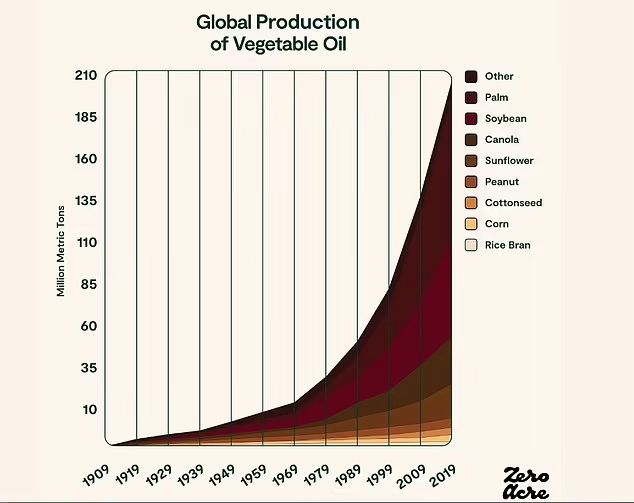For decades, colon cancer has been primarily associated with older adults. Doctors advised routine screenings around age 50, and younger populations were rarely considered at risk. That narrative is changing rapidly—and the data is both alarming and sobering.
Some research projects a 90% increase in colorectal cancer diagnoses among adults aged 20 to 34 by 2030. Imagine that: a disease once considered rare in younger populations is now on track to become a full-blown epidemic.
The obvious question is, why?
While lifestyle factors like obesity and sedentary habits play a role, a less discussed culprit has emerged: seed oils. Ubiquitous in modern diets and heavily marketed as “healthy fats,” these industrial oils may be doing far more harm than good. Emerging evidence suggests they fuel chronic inflammation, weaken immune defenses, and set the stage for diseases like colon cancer.
In this post, we’ll explore the connection between cooking oil, inflammation, and the rising colon cancer rates in young adults. More importantly, we’ll lay out actionable strategies to help you reduce your risk.
A Crisis of Early-Onset Colon Cancer

Colon cancer is now the third most common cancer worldwide, but its surge among young adults is what has doctors on high alert. Over the past three decades, colorectal cancer diagnoses in individuals under 50 have risen by more than 50%.
Consider these staggering statistics:
- Diagnoses among adults 20 to 34 are projected to increase by 90% between 2010 and 2030.
- Over 80% of early-onset colorectal cancer cases are diagnosed at advanced stages, reducing treatment success.
This isn’t just a statistical anomaly. Something is driving the spike, and experts are pointing fingers at modern diets—particularly seed oils and ultra-processed foods.
What Are Seed Oils—and Why Are They Dangerous?
Seed oils—also called vegetable oils—include canola, sunflower, soybean, corn, safflower, and grapeseed oils. Unlike traditional fats like butter, ghee, or olive oil, seed oils are chemically extracted, refined, and deodorized, a process that strips them of nutrients and introduces oxidative instability.
Seed oils entered the mainstream during the mid-20th century. As industrial food production ramped up, these oils replaced natural fats under the guise of being “heart-healthy.” Today, the average American consumes nearly 100 pounds of seed oils annually—a dramatic increase compared to the 1950s.
The Problem with Seed Oils: Omega-6 Overload
Seed oils are high in omega-6 fatty acids, which are essential in small amounts. However, when omega-6 fats dominate the diet—without a balancing intake of omega-3s—this creates a pro-inflammatory environment in the body.
Here’s what happens:
- Omega-6 fats are converted into arachidonic acid, which fuels the production of pro-inflammatory molecules called eicosanoids.
- Chronic inflammation sets the stage for diseases like colon cancer, heart disease, and diabetes.
The Seed Oil-Colon Cancer Connection: What the Science Says
Recent research continues to highlight the significant role of dietary factors—particularly seed oils and ultra-processed foods—in fueling colorectal cancer, especially among younger populations. The groundbreaking work published in 2024 by researchers at the University of South Florida (USF) has revealed how the Western diet, dominated by these inflammatory components, directly contributes to chronic inflammation and tumor growth.
Key Findings from the University of South Florida Study
With support from a five-year, $3.1 million NIH grant, researchers analyzed 162 colorectal tumor samples to explore the impact of diet on cancer progression. The findings, published in December 2024, reveal a compelling link between dietary patterns and cancer:
1. Bioactive Lipids Fuel Inflammation
Tumor samples from patients consuming diets rich in seed oils and ultra-processed foods (UPFs) contained high concentrations of inflammatory molecules. These bioactive lipids actively suppress the body’s healing mechanisms and promote chronic inflammation, a key driver of cancer.
2. Chronic Inflammation as a Root Cause
Chronic inflammation in the colon—akin to a wound that won’t heal—creates an environment where cancer thrives. Diets heavy in seed oils, added sugars, and chemical additives suppress the immune system, allowing tumors to grow unchecked.
3. Suppression of Healing Mechanisms
Healthy fats, like those from avocados or omega-3-rich foods, produce pro-resolving mediators, small compounds that help resolve inflammation and promote tissue repair. The study found that patients consuming ultra-processed diets lacked these beneficial compounds, further impairing their body’s ability to heal.
Frying Oils and Colon Cancer: New Evidence from UMass Amherst
A study from UMass Amherst, published in Cancer Prevention Research, has revealed how frying oils may exacerbate colon cancer and inflammatory bowel disease (IBD). Researchers tested the effects of thermally processed canola oil, commonly used in frying, on mice.
Key findings include:
- Exacerbated Inflammation: Mice fed diets containing frying oil exhibited worsened colonic inflammation compared to those consuming fresh oil.
- Increased Tumor Growth: Tumors in the mice fed frying oil doubled in size compared to the control group, highlighting its potential to advance colon cancer.
- Compromised Gut Barrier: Frying oil increased gut permeability, allowing harmful bacteria and toxins to enter the bloodstream, which further fueled inflammation.
The study suggests that the oxidation of polyunsaturated fatty acids (PUFAs) during the frying process plays a key role. Heated oils produce polar compounds, which the researchers found to be instrumental in driving these inflammatory effects.
While the researchers noted that frying oil alone does not directly cause cancer, they emphasized that consuming fried foods can worsen existing conditions like IBD or colon cancer. As lead author Jianan Zhang advises, “It’s probably a good idea to eat less fried food if you’re prone to these diseases.”
This research provides yet another reason to avoid fried foods and opt for cooking methods that minimize inflammation, especially for individuals with gut health concerns or cancer risks.
Biochemical Impact of Seed Oils
The study highlights how seed oils, such as soybean, corn, and sunflower oil, contribute to colorectal cancer through the following mechanisms:
1. Triggering Inflammation
Omega-6 fatty acids, abundant in seed oils, are converted into arachidonic acid, which produces pro-inflammatory eicosanoids. These molecules accelerate cell mutations and create conditions favorable for tumor development.
2. Suppressing Immune Responses
Inflammatory lipids derived from seed oils weaken the immune system, reducing its ability to detect and eliminate cancer cells.
3. Disrupting Oxidative Balance
Reactive oxygen species (ROS) generated by seed oils amplify oxidative stress, damaging DNA and fostering cancer progression.
Reevaluating Dietary Guidelines: Why Seed Oils Still Dominate
Organizations like the American Heart Association (AHA) continue to advocate for seed oils, citing their ability to lower cholesterol. But these outdated guidelines overlook the long-term effects of seed oils on inflammation, cancer, and overall metabolic health.
New evidence suggests we should shift back to traditional fats like:
- Tallow
- Ghee and grass-fed butter
- Extra virgin olive oil
- Coconut oil
These healthier alternatives are not only anti-inflammatory but also nutrient-dense.
5 Ways to Protect Yourself: Small Changes, Big Impact
1. Eliminate Seed Oils
Avoid canola, sunflower, corn, and soybean oils. Check labels carefully, as seed oils hide in packaged foods, dressings, and sauces.
2. Prioritize Whole Foods
Base your diet on fresh, unprocessed foods like meat, eggs, vegetables, and fruit.
3. Choose Anti-Inflammatory Fats
Replace seed oils with olive oil, avocado oil, and grass-fed butter.
4. Balance Omega-6 and Omega-3 Intake
Incorporate omega-3-rich foods like wild-caught salmon, mackerel, and flaxseeds.
5. Educate Yourself and Others
Understanding the dangers of seed oils empowers you to make better choices. Share this information with loved ones—early prevention saves lives.
The Bottom Line: We Can Reverse This Trend
The rise in early-onset colon cancer among young adults is not inevitable. By identifying seed oils as a major driver of chronic inflammation, we have the power to take action—both individually and as a society.
Change starts with awareness and small dietary shifts. Swap the seed oils for healthier fats, cut back on processed foods, and prioritize whole, nutrient-dense meals.
Your future self will thank you—and so will the generations that follow.









